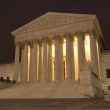Supreme Court to Decide if Vocational Experts Must Show Their Work in Disability Cases
Last month, the nation’s highest court agreed to decide whether a vocational expert at a Social Security Disability hearing must provide evidence to prove that other jobs are available to an applicant for benefits. Often, a vocational expert is present in the hearing room when a Social Security Administrative Law Judge (ALJ) hears an appeal for disability benefits. The ALJ will ask the vocational expert if the disability applicant can work with the limitations caused by his or her disability. Sometimes the judge believes that that the applicant is as limited as he or she says, and other times the judge may not believe the limitations. Either way, the vocational expert will testify as to whether or not any jobs exist with the hypothetical limitations described by the judge.
Social Security regulations stipulate that an applicant is not eligible for disability benefits if there is “substantial evidence” that they can “make an adjustment to other work.” The existence of other work which can be performed in spite of a medical impairment is one of the most common reasons why an individual is denied Social Security disability benefits. This is true even if a person cannot return to the job that they used to do, or have typically performed.
Of course, neither the SSA, nor the ALJ, nor the vocational expert have to actually find you this “other work” and, at least for now, the vocational expert does not have to provide real data to back up their evaluation that other jobs exist that an applicant can do. That is, the expert can rely on his or her “experience.”
In the case headed to the Supreme Court, a lifelong carpenter and construction laborer, Michael Biestek, was forced to stop work in 2005 due to degenerative disc disease, Hepatitis C, asthma, and depression. His initial application for disability benefits was turned down. He appealed this decision and asked that his benefits be back-dated to 2009. An Administrative Law Judge awarded him benefits dating back to 2013, but denied him benefits for the time period of 2009 to 2013 because a vocational expert testified that Mr. Biestek could have found other work as a “bench assembler” or a “sorter.” When Mr. Biestek’s attorney asked for evidence from the vocational expert, she refused to disclose any supporting data and maintained that her files were confidential. The ALJ agreed, and ruled that the expert would be permitted to testify based upon her professional experience without producing “her confidential file[s]” pertaining to “individual people.” The attorney appealed this decision to higher courts but they saw nothing wrong with the vocational expert’s position and affirmed the ALJ’s decision. But the attorney did not give up. He appealed to the highest court in the land, the Supreme Court, which has agreed to decide the core issue in this case: Do vocational experts have to show their work in disability cases?
Oral arguments in the case are expected in the fall when the Supreme Court begins its next term.



